When it comes to purchasing a generator for your house, it’s essential to know how much power your household requires to ensure that you invest in a generator that can meet your needs. Generators are used to provide electricity during power outages, and it’s crucial to choose the right size for your home.
How Big a Generator Do I Need or My House:
The size of the generator you need depends on various factors, including the size of your home, the number of electrical appliances you have, and how much energy they require. Before buying a generator, you need to evaluate your power needs, so you know which generator size will work best for you.
First, determine which appliances and systems in your home are essential to keep running during a power outage. This may include lights, refrigerators, freezers, heating and cooling systems, and medical equipment. Total the wattage of all these items to get an idea of your total power needs.
Next, consider the starting wattage and running wattage of each appliance. Many appliances require a higher amount of power when starting up, which may exceed the generator’s capacity if not accounted for.
For example, a central air conditioning unit may require a running wattage of 3,500 watts but have a starting wattage of 10,000 watts. Knowing these numbers can help you determine the size of the generator you need.
In general, a 5,000-watt generator can power a small home with essential appliances, while a 10,000-watt generator can handle larger homes with more appliances. It’s important to note that the higher the wattage, the more expensive the generator will be.
In conclusion, determining the size of the generator you need for your home requires some research and evaluation. Consider your essential appliances and their wattage requirements, and then choose a generator that can meet those needs. Investing in the right generator size can ensure that you’re prepared for any power outages that may occur.
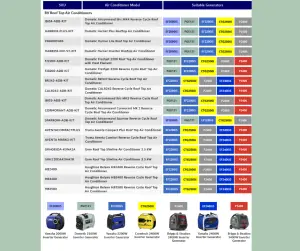
What Size Generator Do I Need For My House Chart:
The size of the generator you need for your house will depend on your household’s power requirements. Here’s a chart that outlines the approximate generator size based on wattage needs:
Total Wattage of Essential Appliances Generator Size Needed
Up to 3,000 watts 3,000 to 4,000 watts
3,000 to 6,500 watts 5,000 to 6,500 watts
6,500 to 9,000 watts 7,000 to 8,500 watts
9,000 to 12,500 watts 10,000 to 12,500 watts
12,500 to 15,000 watts 14,000 to 16,000 wattS
It’s important to note that this chart is a general guideline, and your specific power needs may vary depending on your home’s size and appliances. It’s recommended that you consult with a professional electrician to determine your exact power requirements and the generator size you need.
How Big a Generator Do I Need for My House:
There are other factors to consider when purchasing a generator such as the starting wattage and running wattage. The starting wattage is the amount of power the generator needs to start up and the running wattage is the amount of power it needs to keep running.
If you are only going to be using your generator for a short period of time, you may not need one that has a high starting wattage.
Likewise, if you are only going to be using your generator for appliances that have low wattage, you may not need one with a high running wattage. So, it is important to consider all of these factors when purchasing a generator.
Another thing to consider when purchasing a generator is the noise level. If you plan on using your generator frequently, you will want one that has a low noise level so it doesn’t disturb your peace and quiet.
There are many different generators on the market today and it can be difficult to decide which one is right for you. However, by considering the factors we have discussed in this article, you should be able to find the perfect generator for your needs.
If you have any questions, please don’t hesitate to contact us and we will be happy to help. Thanks for reading!
Age of the generator:
You are correct that the wattage of your household appliances is the most critical factor to consider when buying a generator for your house, regardless of its age. It’s crucial to know the total wattage of the appliances that you need to run during a power outage to ensure that the generator can meet your power needs.
As mentioned earlier, start by identifying your essential appliances and their wattage requirements. You can use a wattage meter or refer to the label on the appliance to determine its wattage. Once you have determined the total wattage, you can choose a generator size that can meet your needs.
It’s also important to consider the starting wattage of your appliances. Some appliances, such as refrigerators and air conditioning units, require a higher starting wattage than running wattage. Ensure that the generator you choose can handle the starting wattage of your appliances to prevent overloading and damage to the generator.
In summary, buying a generator for your house based on the wattage of your appliances is the most effective way to ensure that the generator can meet your power needs. It’s important to consider both running and starting wattage and choose a generator that can handle both to ensure reliable performance. The age of the generator is a factor to consider, but it should not be the sole factor in determining its quality or reliability.
How generators are sized:
Generators are sized based on the total wattage needed to power your household appliances during a power outage. The size of the generator you need for your house will depend on your essential appliances’ wattage requirements, including their starting and running wattage.
To determine the total wattage of your appliances, start by identifying your essential appliances and the wattage required to run them. You can use a wattage meter or refer to the label on the appliance to determine its wattage. Add up the wattage of all the appliances you need to run during a power outage to determine the total wattage needed.
Once you have determined the total wattage, you can choose a generator size that can meet your power needs. Most generators are rated in watts and come in a range of sizes. Choose a generator that has a continuous power rating that is equal to or greater than your total wattage requirement.
It’s important to remember that some appliances, such as refrigerators and air conditioning units, require a higher starting wattage than running wattage. Ensure that the generator you choose can handle the starting wattage of your appliances to prevent overloading and damage to the generator.
In summary, generators are sized based on the total wattage needed to power your essential appliances during a power outage. Determine your total wattage requirement by adding up the wattage of all the appliances you need to run, including their starting and running wattage. Choose a generator that has a continuous power rating equal to or greater than your total wattage requirement and ensure that it can handle the starting wattage of your appliances.
What size generator do i ?
To determine what size generator you need, you will need to calculate the total wattage of your essential appliances that you need to run during a power outage. Once you have determined the total wattage, you can choose a generator that has a continuous power rating equal to or greater than your total wattage requirement.
Here’s a general guideline of what size generator you may need based on the total wattage of your essential appliances:
- Up to 3,000 watts: 3,000 to 4,000 watts generator size needed
- 3,000 to 6,500 watts: 5,000 to 6,500 watts generator size needed
- 6,500 to 9,000 watts: 7,000 to 8,500 watts generator size needed
- 9,000 to 12,500 watts: 10,000 to 12,500 watts generator size needed
- 12,500 to 15,000 watts: 14,000 to 16,000 watts generator size needed
Remember to also consider the starting wattage of your appliances, as some appliances require a higher starting wattage than running wattage. Ensure that the generator you choose can handle the starting wattage of your appliances to prevent overloading and damage to the generator.
It’s recommended that you consult with a professional electrician to determine your exact power requirements and the generator size you need. They can also help you choose the best generator brand and model that suits your needs and budget.
What size generator do I need for my camper?
The size of the generator you need for your camper will depend on the total wattage of the appliances and electrical devices you need to power. Here are the steps to determine what size generator you need for your camper:
- List down all the electrical devices and appliances that you plan to run using the generator. This may include an air conditioners, refrigerators, lights, television, microwave, and other electrical devices.
- Determine the wattage requirement of each device. You can check the manual of each device to find the wattage rating or use a wattage meter to measure the wattage.
- Add up the wattage of all the devices that you plan to run simultaneously. This will give you the total wattage requirement.
- Choose a generator that has a continuous power rating that is equal to or greater than the total wattage requirement you calculated.
As a general guideline, a 3,000-watt generator can power a camper with basic appliances, including an air conditioner, refrigerator, lights, and television. If you plan to use more electrical devices, you may need a larger generator.
Keep in mind that some appliances may require a higher starting wattage than their running wattage. Ensure that the generator you choose can handle the starting wattage of your appliances to prevent overloading and damage to the generator.
It’s recommended that you consult with a professional electrician or a generator expert to determine your exact power requirements and the generator size you need for your camper. They can help you choose the best generator brand and model that suits your needs and budget.
What size generator do I need for an RV?
The wattage requirements for running an RV are pretty much the same as those for a camper. Most of the time, you will need a generator with at least 4000 watts to run all the appliances and an air conditioner.
what size generator do i need for a small house .If you do not require an air conditioner, or if your RV only runs the refrigerator and lights with its on board generator, a 2000-watt generator should do just fine.
Again though, if you need to run the air conditioner this will more than likely exceed the power capabilities of a residential grade generator.
If you are running low voltage appliances in your RV, you may be able to get away with a smaller generator.
Which appliances use the most power?
Some of the biggest energy consumers in your home are air conditioners and refrigerators. Air conditioners can require upwards of 5,000 watts to run, while refrigerators typically require between 300-600 watts.
The rest of your appliances will only need anywhere from 1-3 watts to run, although larger items such as microwaves and washers can require much more.
What size generator do I need for my house?
A house is the most demanding load you can put on a generator and requires an output of about 7000 watts. This will allow you to run most of the appliances in your home at the same time.
If you have a central air conditioner, it is important to keep in mind that it alone can use up to half of the wattage available on a generator.
Some people may choose to purchase a larger generator in order to run all the appliances, but this will cost more money.
If you only need to run a few appliances, it may be better to purchase two or three smaller generators to meet your needs, rather than one large generator that costs significantly more.
What size generator do I need?
For most applications, the best choice is a gasoline powered portable engine that falls in the 2000–4000-watt range. This will cover most appliances in the home, RV or camper.
If you have a central air conditioner in your home, you may need a 7000-watt generator or larger. Remember to add up all of the watts used by your appliances when choosing a generator; running an air conditioner can easily double or triple your requirements.
If you only need a generator for a few appliances, it may be cheaper to buy a 2000–3000-watt unit and use one or two generators rather than purchasing a 7000-watt generator that doesn’t have enough power to run everything at once.
What Size Generator Do I Need For My House Calculator:
There are several online tools and calculators that can help you determine what size generator you need for your house based on the total wattage of your essential appliances. Here are a few calculators that you can use:
- Generac Power Systems: This calculator helps you determine the generator size based on the square footage of your home and the wattage requirements of your essential appliances. You can also customize the list of appliances and their wattage ratings to get a more accurate result.
you need in 3 simple steps:
Step 1. Determine the power needs of your appliances and devices based on their wattage ratings.
Please note that this is not 100 percent accurate, but it will give you an idea what size generator you need.
- Power (watts) = Voltage (volts) X Amperes (amps).
- To calculate the power in watts, multiply the voltage by the amps as shown above.
iii. You can find the voltage and amperage on a label typically located near where an appliance plugs into a wall outlet or from the manual for your appliance if you have it available.
- Enter all of this information below with your device plugged in to use the wattage calculator.
- After you plug in your appliance, circle the cAll Postsorrect size generator above to get what size generator do you need for a house.
Step 2. Find an area outside where you can open any windows and doors so it can vent properly after running for at least 30 minutes.
Please take into consideration the amount of Carbon Monoxide (CO) emitted from a generator. Never run a generator in an enclosed area like your house, camper or RV!
Step 3. Find the right generator for your needs by clicking on the corresponding link below.
Just power the essentials:
If you’re only looking to power a few essential household appliances – like a refrigerator, furnace and lights – you likely don’t need anything more than a portable generator. A generator in the 5,000-7,500-watt range should do the trick.
Powering a large home or several appliances:
If you’re looking to power a larger home, or want to run several appliances at once, you’ll need a bigger generator. In this case, you’ll want something in the 10,000-15,000-watt range.
Powering an RV:
If you’re looking to power an RV, you’ll need a much bigger generator. A 20,000-watt generator should do the trick, but if you’re looking to power an RV with an AC unit, your best bet would be a 30,000-watt generator.
Powering multiple RVs or other large appliances:
If you are powering more than just one rv, or you have other large appliances that need to be powered, you will need to go up in size and get a generator with more than 30,000 watts of power.
When sizing a generator for your needs, it’s important to keep in mind the wattage requirement of the devices you plan to power.
You can find the wattage requirement of your appliances in the owner’s manual or on the manufacturer’s website.
You can also find reviews and product specs for many portable generators online – Genaratorscan.com, for example has a generator selector tool that will help you size a generator quickly and easily based on your power requirements.
Conclusion:
In conclusion, determining the right size generator for your home or camper is crucial to ensure that you have enough power to run essential appliances during a power outage. To determine the right size generator, you need to calculate the total wattage requirement of your appliances and electrical devices, including their starting wattage.
There are various online tools and calculators that you can use to calculate your total wattage requirement and determine the generator size you need. However, it’s recommended that you consult with a professional electrician or a generator expert to ensure that you get an accurate result and choose the best generator brand and model that suits your needs and budget.
Remember that investing in the right size generator can provide you with peace of mind during power outages and ensure that you and your family are comfortable and safe.
I hope this information How Big a Generator Do I Need or My House has been helpful. If so, please share it with your friends and family.
Related Buyer’s Guides
- List of 10 Best Generators for RV
- List of Top 6 Best Portable Inverter Generators
- List of Best Quiet Generator
- List of 10 Best Generators with Inverter
- List of Best Solar Generators
- List of 6 Best Inverter Generator
- List of 6 Best whole House Generator
- List of 7 Standby Generators
- List of Best Duel Fuel Generator
- List of how-big-a-generator-do-i-need-for-my-house
- List of small-generators-for-camping
- Liat of Quitest-inverter-generator-reviews
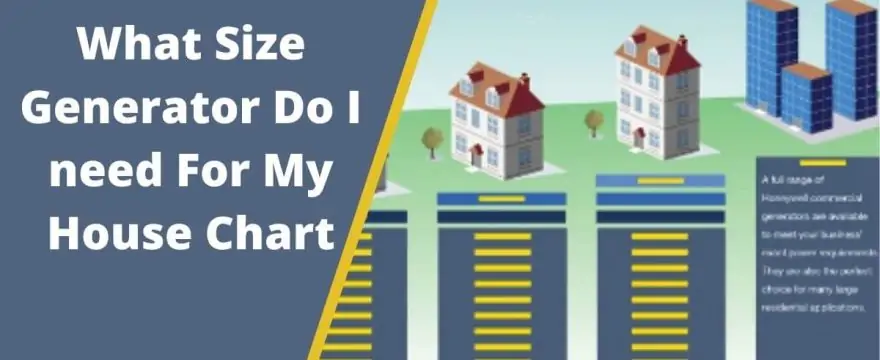
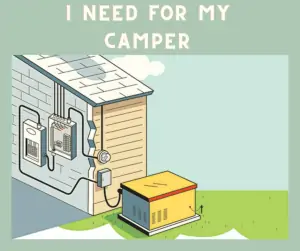
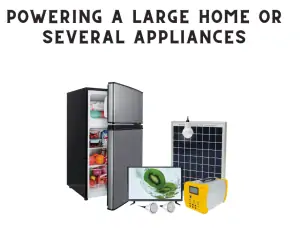
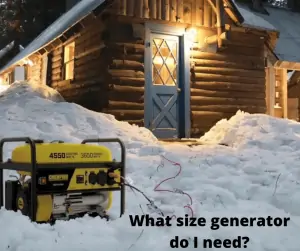
Leave a Reply